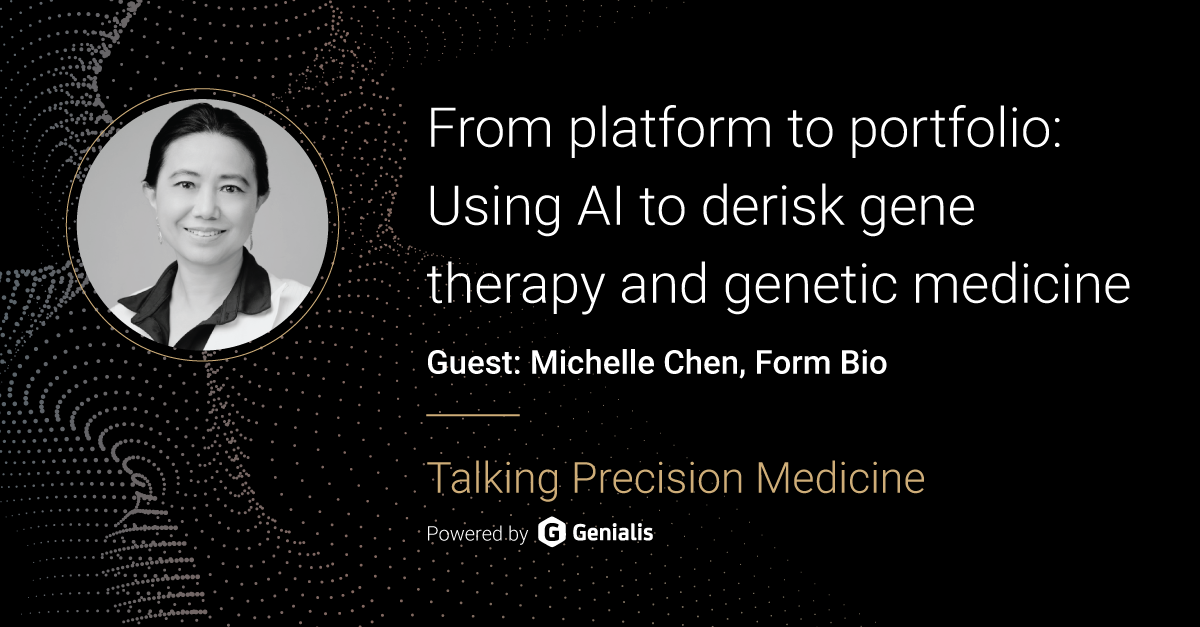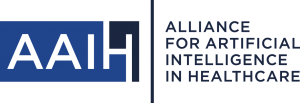Welcome to Talking Precision Medicine (TPM podcast) — the podcast in which we discuss the future of healthcare and health technology, and how advances in data and data science are fueling the next industrial revolution.
In this episode Rafael sits down with Michelle Chen, President and CEO of Form Bio, a techbio company using AI to advance genome engineering and the development of genetic medicines. Michelle shares her zigzag journey from scientist to executive, how her team is tackling the biggest bottlenecks in gene therapy, and why AI has become essential in designing safer, more effective treatments.
Come on in and have a listen.
Episode highlights:
Form Bio
- Form Bio, the first spinout from Colossal Biosciences, develops genetic medicines and genome-engineering solutions with AI, expanding Colossal’s foundational multi-species genome engineering technology into applications for human health.
- Today, the company applies its technology to human health, especially AAV gene therapy and genetic medicines.
A zigzag career shaped by curiosity
- Michelle’s career spans 25 years across biotech, pharma, and diagnostics, moving from bench science into global corporate development and executive leadership.
- She began as a bench scientist, working on small molecules, peptides, and antibodies, before transitioning into product management at Agilent — an experience she calls her “real-world MBA.”
- Her later roles at Roche, Merck, BioMarin, WuXi Biologics, and Insilico Medicine combined scientific depth with strategic and commercial insight.
- Michelle is active in board and advisory roles, and highlights the importance of physical, mental, and spiritual health in sustaining leadership.
“I got into science because of curiosity. It was my childhood dream to become a scientist and discover some secrets of the laws of nature.”
Solving bottlenecks in gene therapy
- Gene therapy faces major challenges, including manufacturing issues, expression control, and immunogenicity.
- Form Bio’s AI tools improve codon optimization, genome assembly, and payload design, aiming to increase expression levels and reduce safety concerns.
- The company has shown it can rescue stalled programs and enable second-generation genetic medicines.
“Once you put in the caps, there’s a lot of empty capsids with no payload. It’s like orange juice that’s ninety-nine percent water, only one percent real orange juice. That won’t taste good, right? And this is exactly what happens to patients. You have to get enough in so that the real payload actually reaches the patient.. And then the question is how much gets to the target organs.”
Leading with purpose and balance
- Michelle defines health as harmony between physical, mental, and spiritual dimensions.
- She practices meditation and mindfulness to sustain focus and perspective amid the intensity of biotech leadership.
- Her philosophy of leadership centers on empathy, clarity, and creating space for creativity.
“I used to play guitar in graduate school, particularly when I was very frustrated, when nothing was working in the lab. […] When the string is too tight, it breaks. This is what happens to people who are always working. When it’s too loose, it doesn’t make music, like people who are just too laid back. They don’t have enough pressure, tension. It’s a balance to have tension, but still have enough elasticity so you can play good music.”
AI’s role in the future of drug development
- Michelle envisions AI as a personalized health companion, capable of integrating genetic, lifestyle, and behavioral data. Such systems could provide personalized advice for medication, nutrition, and sleep — extending beyond treatment to prevention.
- She believes this future is achievable within the next decade or two, as data and computation become central to daily life.
“The ultimate of my dream is to have something like an AI personalized physician for each of us. […] It’s not just for physicians, it’s almost like a health coach, if you will.”
This has been Talking Precision Medicine. Please subscribe and share our podcast with your colleagues, leave a comment or review, and stay tuned for the next episode. Until then you can explore our TPM podcast archive and listen to interesting guests from our past conversations.




